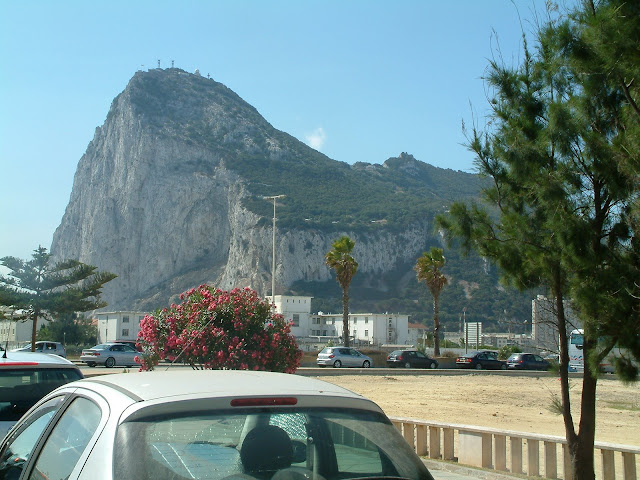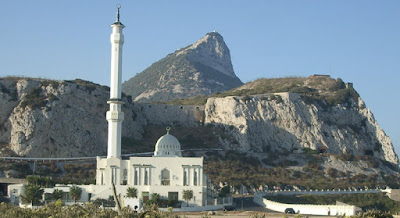Writers and Place
In the past couple of years, I have become increasingly interested in how stories link us to a particular time or a particular place. Or the reverse, time and place can influence and inspire the stories that we tell.
This happens the world over, in all of our stories. Dickens wrote about the London of his lived experience, and left us with a legacy of an intimate understanding of the slums and rookeries of the capital and with what amounts to a familiarity to the characters that peopled it. Chaucer had the same effect when he told his 'Canterbury Tales.'
Writing Gibraltar
Closer to home, Mark Sanchez achieves a similar effect with his stories set in modern Gibraltar, bringing to life this tiny city in southern Europe that is not British except politically, nor European nor Spanish nor yet its own identifiable self. In 'Jonathan Gallardo' we meet the Gibraltarians of the seventies and eighties in a narrative infused with the dark humour that is redolent of the people who live on the Rock. In 'The Escape Artist', we see the world through the eyes of a Gibraltarian student attending university in UK, and we encounter the differences and similarities between the working class Gibraltarian student and the 'upper class' Gibraltarian student, as Gibraltar works its way through the legacy of the British colonial class system.
Almost every piece of writing will contain the echoes of the writer's lived experience. Camus' life in North Africa shines through his novels "L'Etranger" and "La Peste"; Tahar ben Jelloun's Morocco and the urge to seek a new life in Europe speaks at us through the lines of his novel "Partir." Jack Kerouac's "On the Road" is as much a novel of its place and time as is Austen's "Pride and Prejudice" and Cervantes' "Don Quixote". Chimimanda Ngozi Adichie creates a detailed picture of Nigeria and the Biafran war in her novel "Half of a Yellow Sun". I could go on...
As writers, we are the sum of all our lived experiences, of the experiences of the places where we live and the people who inhabit our lives. This emerges in our stories.
The reason writing is such a critically important part of Gibraltar's cultural growth, part of the evolution of the Gibraltarian identity, is because it is through writing our individual stories that those lived experiences are recorded and transmitted to others, to those outside Gibraltar, and to the future generations of Gibraltarians.
We are growing our body of literature, slowly but steadily, and when a Gibraltarian book is published and talked about in the universities and book shops and cafe's of the rest of the world, I am proud and delighted in equal measure. When our local writers' work is published and read around the world, like playwright Julian Felice's plays are performed in London and in USA, we should be excited that our stories are reaching out from our home and touch the lives of others. When our story tellers like Amy Montegriffo and Elena Sciatiel win writing competitions hosted in other countries, as they have done recently, or like Jonathan Pizarro and Giordano Durante, are published in international magazines and journals, it's wonderful, both for them as budding writers and for Gibraltar.
Echoes and Ripples by Amy Montegriffo
Poems by Giordano Durante published in Blue Gum
I found Pizarro's story, "La Frontera," remarkably touching, because I was one of those whose family left to live in England because the frontier was closed and those feelings and experiences were caught and expressed in the story of another. My experiences were no longer unique - there were others who shared them. There came a sense of belonging as I read this story, and that is precisely what good literature, influenced by place and time achieves. You can read it here:
Untitled Writing: La Frontera by Jonathan Pizarro
And when poets like Jonathan Teuma and Gabriel Moreno perform their poetry to international audiences in London and Madrid, Gibraltar's stories, in our words, our accents, truly are heard. Each one of those writers are deserving of all of our support, especially now, in the wake of a pandemic that may be focusing our attention on economic growth rather than on the wealth that artistic growth can bring to our society.
Gabriel Moreno
Jonathan Teuma performing 'Friendship' online for GBC Open Day
As for those writers who are perhaps not publishing regularly, or have not yet sold their work on, or have not submitted their work for publication, their stories are also our stories. Take Omkeltoum Serroukh's story, "Growing Old."
This is a recollection of the writer's experience of rural Morocco. Omkeltoum was born in Morocco who lives and works and raises her family in Gibraltar. The link between Morocco and Gibraltar is ancient and endures. Her story reminded me of my Grandfather's stories of his years in Morocco when he spent his teens in Tangiers and Melilla before the war. The story touches old memories in me. It is raw, written in a way where the Moroccan voice echoes in the ears; the English is perhaps not smooth but the language sounds authentic. The story reveals a simple rustic life through the eyes of a young person raised in the city and it touches on the enduring world-wide theme of youth and age, of the awakening of the young to the loneliness of old age. My thanks to Omkeltoum for permitting me to publish it on this blog. I hope you all enjoy reading it. You can find it here, in the Simply Stories pages of Write Gibraltar.
Simply Stories - Growing Old by Omkeltoum Serroukh



